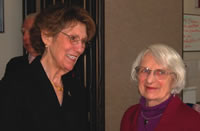

Seniors take precedence on Law DayBy Dean Kinley An elderly man complained that his local bank required him to put one of his kids' names on his checking account before he could do business with them. A woman of the same age told of a "legal service provider" taking her money but never providing any service of any kind. Meanwhile, a 3-year-old accompanying his mom and grandmother played peek-a-boo from the back door with an English-speaking grownup who didn't understand much from the questions and answers in Spanish. An atypical scene perhaps for those of us who work in offices or courthouses, but pretty much business as usual for Spanish-speaking senior citizens and their extended families who live in the Coachella Valley east of southern California's more populated areas. This particular forum at the Coa-chella Senior Center featured the State Bar's newest publication, Seniors & the Law: A Guide for Maturing Californians,, which hit the streets last month in conjunction with two events: Law Day on May 1 and Older Americans' Month as proclaimed by President Bush for the month of May. Funded partially by the Foundation of the State Bar of California, Seniors & the Law is being distributed by the California Bar Journal and the bar's Office of Media & Information Services. While the Coachella event is the only one of the 14 scheduled forums to be conducted totally in Spanish, the issues raised and the information people are seeking are not dissimilar from urban to suburban to rural areas throughout California. The Coachello forum also brought quick results. By the next morning, the mayor had learned of the bank's practice of requiring co-signers on checking accounts and after a quick call to the bank president, the policy was discarded. In the San Fernando Valley, an elderly couple worried because the husband had lost his driver's license and they now had few options for getting anywhere. The loss of dignity clearly took precedence over the loss of mobility. In San Francisco's Mission district, an elderly man was concerned about abuse against men. His question brought some titters from the audience, but the response quieted the crowd: Senior men frequently are targets of abuse, he was told by an Adult Protective Services representative, and elder abuse is so prevalent among both sexes that it is one of the major issues addressed in the Seniors & the Law guide.
In fact, Helen Karr (see California Bar Journal, April 2003, page 1), who became a lawyer at age 64 and served as research assistant for the bar's Seniors & the Law project, spends most of her time on elder abuse, donating two days a week to the San Francisco district attorney's office and devoting the rest of the week to raising awareness of the problem. At each of the public forums Karr has attended, she sports her gold elder abuse awareness pin, which she helped design, and encourages every participant to be on the lookout for signs of elder abuse around them: seniors in the care of others who are unhygienic, sport bruises or scars, seemed starved for nourishment or attention or otherwise are neglected. In addition to elder abuse, the Seniors & the Law guide and the public forums cover many diverse issues: from problems with Social Security, to creating power of attorney, to finding free meals, to monitoring nursing homes, to preparing a will. The guide is available in both English and Spanish and also is on the State Bar's website at www.cal bar.ca.gov. While the bar has "rolled out" Seniors & the Law through the series of public events across the state, the guide is available to everyone simply by e-mailing (barcomm@calbar.ca. gov) or writing the bar (The State Bar of California, Attn: Seniors & the Law, 180 Howard St., San Francisco, CA 94105-1639). When ordering, please remember to state your name, complete mailing address (P.O. Boxes are not acceptable), the number of copies ordered and choice of "English" or "Spanish" version for each number, and a daytime phone number. The guide is free, but any contributions via check made payable to The State Bar of California and sent to the above address will be gratefully accepted. |
||||||||
|
||||||||
